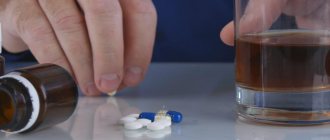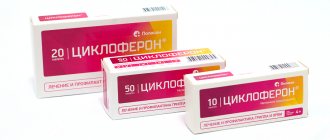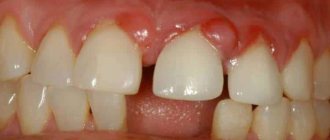Instructions for use
Pharmacological properties
Pharmacodynamics:
Biotredin® is a regulator of tissue metabolism, increases mental performance, has a therapeutic effect in alcohol withdrawal, and reduces the craving for alcohol.
Threonine in the presence of pyridoxine (vitamin B6) breaks down into the amino acid glycine and acetaldehyde, which stimulate inhibition processes and at the same time redox reactions, respiration processes and the synthesis of adenosine triphosphate (ATP) in cells, due to which the drug is able to:
- improve short-term and long-term memory;
- increase mental performance;
- reduce psycho-emotional stress;
- increase and normalize the level of endogenous acetaldehyde and, thereby, reduce the phenomenon of alcohol withdrawal syndrome and craving for alcohol.
The effect of Biotredin® appears 10–20 minutes after administration under the tongue.
Pharmacokinetics:
threonine and pyridoxine are completely metabolized to their final products. They do not accumulate in the body.
Indications for use
Indications for use:
prescribed to children, adolescents and adults with decreased mental performance and concentration.
The drug is prescribed to persons who abuse alcohol, patients with chronic alcoholism when the pathological craving for alcohol is actualized, combined with affective (irritability, low mood, internal discomfort), sensory (hunger) and ideational (thoughts about alcohol) disorders, with alcohol withdrawal syndrome, and also to maintain remissions.
Contraindications:
alcohol intoxication, simultaneous use of medications that depress the central nervous system (anxiolytics, antipsychotics (neuroleptics), antidepressants, etc.), increased sensitivity to vitamin B6.
It is not recommended for use in congenital galactosemia, glucose malabsorption syndrome and congenital lactase deficiency, because the drug contains lactose.
Precautions for use:
does not require special precautions.
Use during pregnancy and breastfeeding:
No separate studies have been conducted. Not recommended for use during pregnancy and breastfeeding.
For alcohol abuse and alcoholism, the drug can be used during pregnancy and breastfeeding if the expected therapeutic effect outweighs the risk of developing possible side effects.
Directions for use and doses
The drug is prescribed in tablets under the tongue or in powder form after crushing the tablet. The greatest effect of Biotredin® is achieved when combined with the drug Glycine. 1 tablet (100 mg) of Glycine is taken under the tongue 10–15 minutes before taking Biotredin®.
As a means of increasing attention and mental performance: children, adolescents and adults, 1 tablet 2-3 times a day for 3-10 days. If necessary, the course is repeated 3–4 times or more per year.
Treatment of alcohol withdrawal syndrome: on the first day, 1-4 tablets 3-4 times a day (daily dose 3-16 tablets), on the second day and further, 1-2 tablets per dose 2-3 times a day (daily dose 3-16 tablets). 6 tablets) for 21–28 days. The course can be shortened to 10–14 days.
For patients with chronic alcoholism and alcohol abuse: 1-3 tablets per dose 2-3 times a day for 4-5 days. If necessary, courses are repeated 5–10 times a year.
During the period of remission, to identify hidden cravings for alcohol: 2-3 tablets of Biotredin® are taken on an empty stomach. The appearance of mild dizziness, a calming effect, facial redness, and sweating within 10–20 minutes indicates the presence of “hidden cravings.” In these cases, a 5-10 day course of Biotredin® together with Glycine is recommended: 1-2 tablets 2-3 times a day. Glycine is taken 1 tablet (100 mg) under the tongue 10–15 minutes before taking Biotredin®.
Additional Information
Side effect:
dizziness, increased sweating, allergic reactions due to vitamin B6 intolerance.
Overdose:
no cases of overdose have been identified.
Interaction with other drugs.
Incompatible with antipsychotic drugs, antidepressants, anxiolytics, barbiturates. Weakens the effect of antipsychotics (neuroleptics), antidepressants, barbiturates and other drugs that depress the central nervous system.
The possibility of the drug influencing the ability to drive vehicles and other potentially dangerous mechanisms:
does not affect.
Special instructions:
It is not recommended to use during intoxication, because the therapeutic effect of the drug decreases. The drug contains lactose, and therefore it is not recommended for use in patients with congenital galactosemia, glucose malabsorption syndrome, or congenital lactase deficiency.
Release form:
sublingual tablets, 5 mg+100 mg. 30 tablets in a blister pack made of polyvinyl chloride film and aluminum foil. 1 blister pack along with instructions for use in a cardboard pack.
Storage conditions:
in a place protected from light at a temperature not exceeding 25 ° C. Keep out of the reach of children.
Best before date:
3 years. Do not use after the expiration date indicated on the package.
Vacation conditions:
available without a prescription.
Name and address of the place of production of the medicinal product / organization accepting complaints from the consumer:
LLC "Medical Research and Production Complex "BIOTICS". Russia, 115404, Moscow, st. 6th Radialnaya, 24, building 1, 2, 14, 15.
Tel.:.
Toll free hotline:
8-800-100-32-22.
Alcohol and alcoholism are a real social problem
Drinking alcohol has long been an integral part of social life for most people. The hard facts: per capita alcohol consumption in Russia is about 10 liters per year, and approximately 1% of the population suffers from alcohol dependence.
In some regions, excessive alcohol consumption is indirectly or directly responsible for a significant proportion of deaths. Large amounts of alcohol primarily affect the liver and gastrointestinal tract. Complications such as atherosclerosis, osteoporosis (bone fragility), vitamin deficiency, anemia, and malignant tumors also occur. In addition to diseases caused directly as a result of alcohol intoxication, fatal consequences include road accidents, suicides, and crimes committed while intoxicated.
How does alcoholism occur?
Alcohol entering the brain increases the concentration of certain neurotransmitters, such as dopamine and endorphin. They cause short-term pleasant feelings of intoxication - euphoria, relaxation, decreased anxiety - and lure a person into a trap. A psychological dependence is formed, forcing you to drink more and more.
Alcohol metabolism and consequences of abuse
Meanwhile, the body detoxifies the alcohol by turning it into acetaldehyde. The latter is always contained in the body, but in high concentrations it is a strong toxin. Therefore, with the help of the enzyme acetaldehyde dehydrogenase, it is converted into acetic acid and then excreted from the body.
Drinking alcohol for a long time leads to the fact that the body is forced to adapt to the constant presence of alcohol in the blood - the sensitivity of receptors decreases, and its own production of neurotransmitters decreases. At the same time, the body fights constant poisoning - the activity of enzymes increases to more quickly neutralize the toxin.
If you stop drinking in this situation, the levels of acetaldehyde and neurotransmitters drop sharply below the new normal level, causing withdrawal symptoms. This is how tolerance, physiological dependence and withdrawal syndrome develop. Nothing makes you happy, life seems bland, and there is only one way to return to normal mood - to drink.
Unfortunately, it is almost impossible to completely cure the consequences of alcoholism, but a person can almost always control his addiction. To do this, it is necessary to start treatment as early as possible.
Signs of developing addiction
First stage: the desire to drink constantly arises, thoughts about alcohol often come to mind. Control of the amount drunk and a critical attitude towards alcohol decrease.
Second stage: tolerance to alcohol appears - even large doses do not cause the usual sensations. Drinking alcohol becomes necessary, and if drinking is stopped for some reason, extreme irritation occurs and the mood deteriorates. Withdrawal syndrome occurs.
Third stage: the inability to stop drinking develops, which causes periods of binge drinking. At this stage, the psyche is already seriously suffering, the personality is gradually destroyed.
How Biotredin works for alcoholism
Biotredin can reduce the severity of withdrawal symptoms after quitting alcohol, as well as reduce the craving for alcohol by correcting metabolic disorders that underlie alcohol dependence.
It acts on the second, enzymatic, mechanism of withdrawal syndrome development. Due to the constant high level of acetaldehyde in cells, the activity of acetaldehyde dehydrogenase increases, and the cells’ own synthesis of aldehyde decreases. In such a situation, an attempt to abstain from alcohol leads to withdrawal syndrome, the person experiences symptoms of “withdrawal”.
The components of Biotredin - threonine and pyridoxine - interfere with this process.
Threonine in the body breaks down into the amino acid glycine and acetaldehyde. The resulting acetaldehyde restores the concentration of this metabolite to normal, reducing the symptoms of withdrawal syndrome, as well as reducing the craving for drinking alcohol during treatment.
Pyridoxine (vitamin B6) promotes the formation of acetaldehyde from threonine, and also stimulates restoration processes in nervous tissue damaged by ethanol.
How to take Biotredin
Biotredin is taken sublingually - kept under the tongue until completely dissolved.
To treat withdrawal symptoms, Biotredin is taken according to the following regimen:
on the first day, 3-4 tablets 3 times a day, and then 1-2 tablets 3 times a day for a month.
To reduce cravings for alcohol during abstinence:
carry out a weekly course - 1-3 tablets 2-3 times a day. From 5 to 10 courses are required per year, depending on the strength of attraction.
Biotredin should not be taken during periods of heavy drinking and during intoxication - the therapeutic effect during intoxication is significantly reduced.
Taking Biotredin should ideally be part of a comprehensive treatment for alcoholism - both medicinal and psychotherapeutic. In this case, addiction can almost always be overcome.
Checking for hidden cravings for alcohol
The most difficult question in treating alcohol addiction is when is it all done? When can you relax? It seems that there is no longer any traction. But the slightest temptation and the person breaks down. To answer this question, you can use a test with Biotredin.
The fact is that until the regulation of acetaldehyde levels in cells is normalized, the likelihood of a breakdown is very high. A test with Biotredin allows you to understand how things are.
The sample can also be used to determine developing alcohol dependence in adolescents.
To identify a hidden craving for alcohol, take 3 Biotredin tablets on an empty stomach. The appearance of dizziness, redness of the skin, sweating and other symptoms similar to mild intoxication indicates that there is a high probability of hidden cravings.
It is better to carry out the test at home, in a calm environment, to make it easier to notice the symptoms.
*Please note that in rare cases, a positive reaction to the test can also develop in non-drinkers. This may be due to congenitally low levels of acetaldehyde or any underlying medical conditions.







